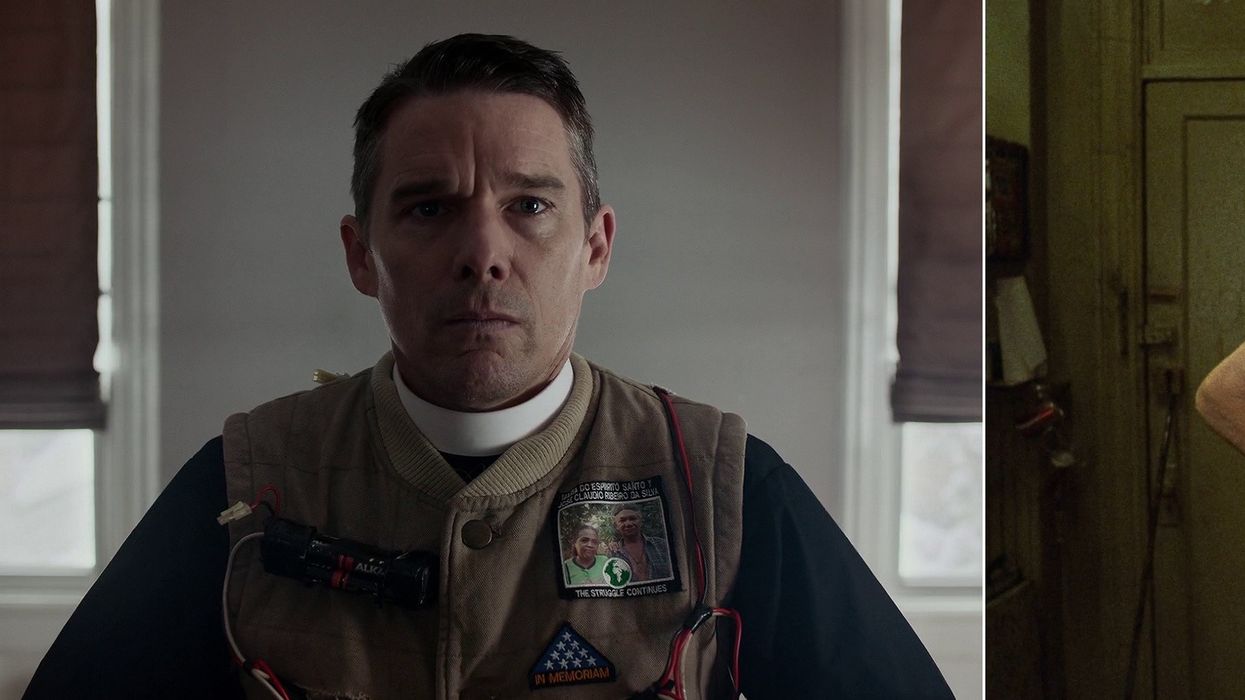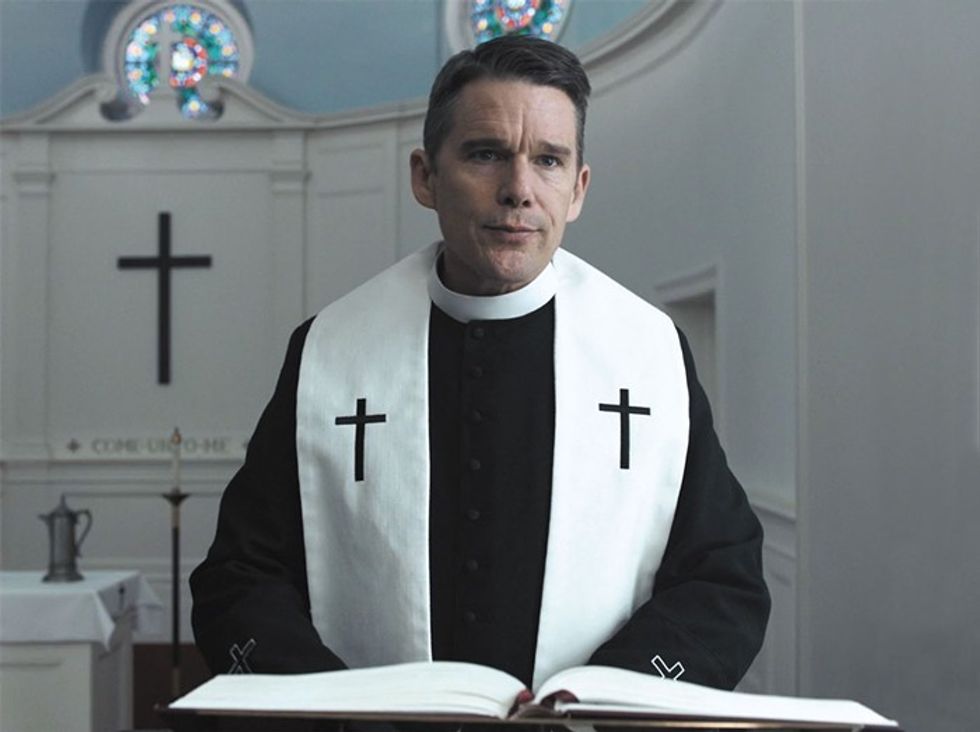Old vs. New Testament: 'First Reformed' & 'Taxi Driver' Deconstructed
Paul Schrader is interested in life, death, humanity, God, and punishment. We theorize how his message has changed over the past 40 years.

When Taxi Driver debuted, it was the talk of the town. It was an angry, vengeful movie about how seedy New York had gotten and how one man intended to clean it up by tuning his body and mind into becoming a killing machine. The film's writer, Paul Schrader, was raised a Calvinist and didn't see his first movies until he was a young adult. This sheltered lifestyle meant the only stories Schrader was raised on were biblical, and they would go on to influence all of his work.
Schrader and his world view helped define some of the biggest movies of the 70s and 80s. His writing and directorial style allowed him to become one of the most independent voices within filmmaking.
In 2018, he came back with First Reformed, a powerful movie about another man fed up with the follies of mortals, but this time the message was much more about forgiveness and hope.
Today I'm going to go over the lead characters in Taxi Driver and First Reformed and talk about how they work as mirrors of one another, and have similar internal struggles, but completely different endings.
Spoilers for both films to follow.
A Note: We'll be digging into Christianity and the Bible within this post. I don't pretend to be a scholar and my analyses within this post are my own. I'm excited to see a discussion on the movies, their inspiration, and the morals each espouses throughout the films.
Travis Bickle's Character Arc
Travis Bickle is a guy who wants revenge. When we meet him, he's a Vietnam veteran with PTSD who can't sleep. He's decided he wants to drive a cab to make more money and has a real issue with concentrating. Travis is obsessive. It starts with driving all hours, all sort of people.
Travis witnesses the seediness of New York and the filth becomes a part of him. Then that infatuation shifts when he meets Cybill Shepherd's character, Betsy.
Travis begins stalking her, eventually asking her out on a date.
But Betsey doesn't change Travis. Her rejection after he takes her to a porno theater only drives him deeper toward insanity and violence.
Travis changes when he meets Iris, portrayed by Jodie Foster. Iris is a kid, she should be eating popsicles and playing outside, but instead, she's turning tricks for an evil pimp. Travis sees the innocence in Iris. A girl who's childhood is stolen, the same way Travis' was stolen in war.
The same way New York's innocence has been stolen by all the dealers and pimps he sees every day.
The same way New York State is being mucked up by the worst politician ever, Palantine.
Travis is certain the only way to stop all this stuff is to kill, so instead of continuing to ruin himself with bad food and lust, he rededicates himself to cleaning up the city. Travis works out, buys and learns to use guns, eats healthy, and begins his elaborate plan.
This involves witnessing to Iris, telling her the way the world should be, and even contemplating an assassination (that ends up going awry).
Travis realizes the only way to fix New York is to start small, so he vows to free Iris from her pimp. Travis shoots her pimp, attacked the guy running the brothel, executes Iris's client, and gets shot up a ton in the process. His rage carries him through the ordeal and drives him further into insanity, willing the police to kill him.
If you think Travis dies at the end, the movie ends here, and everything that follows happens when he's in heaven.
If you take the ending of Taxi Driver literally and think he survives this ordeal, Travis is healed and baptized through the blood and carnage. Iris is freed and sent back to her parents
And Betsy, seeing that Travis is a good guy, hails his cab and they start a beautiful relationship together.
Travis's arc is one of violence. He becomes pent up and only can release his rage through a cathartic act of violence. The people he confronts deserve to die and the movie asks us to root for their demise. Travis is vengeful, and watching him, we endorse his vengeance.
Has the world gotten better since 1976?
Maybe not.
But Paul Schrader's heart may have gotten bigger.
Reverend Toller's Character Arc
Reverend Toller is a priest who happily serves. He's a man who experienced real trauma in his life and that pain brought him to the cloth. He's a man who has failed as a priest. He's had affairs, he drinks too much, and now he's keeping a journal to let us know what's been on his mind.
Toller is a long-suffering man. He works at the old church, the one without much of a congregation but a lot of history.
The people in his pews are lost souls.
Toller toils and toils until he meets his greatest challenge yet, Mary. Mary is pregnant, but her husband is not happy about it. He doesn't want to bring an innocent child into the world, because the world is dying. Her husband is particularly angry about a man who runs a chemical company, who happens to be a constituent of the megachurch which oversees Toller's church.
At first, Toller is disturbed by this man. He has the life Toller lost...the life he thought he deserved...and this man is throwing it away like the litter he's so mad about.
But the deeper Toller goes into his argument, the more he agrees with him.
Then the man shoots himself and Mary finds a suicide vest in his garage.
Toller realizes that this man was onto something. That maybe we humans don't deserve the earth, we don't deserve life.
And he slowly decides that the people perpetrating these crimes against the earth need to die to make her healthy again.
Toller wants Mary's child to have an Earth that is pure and healthy.
But unlike Travis Bickle, this doesn't mean Toller takes care of himself. He shirks off doctor visits, diagnosis, and continues to drink alcohol-laden Pepto Bismal to get by. He also plots. He knows his church is going to be used for the big celebration, that the board of this chemical company will be there, and that with one explosion he could punish them and make a statement.
And...we kind of agree with him.
But Toller sees Mary and knows she's also going to attend the event, no matter how hard he pushes her away. He toils back in the garden, as Jesus did, and eventually makes his decision to sacrifice.
When it comes time for him to do it, he wraps himself in barbed wire, straps on the suicide vest, and can't go through with it.
Mary walks into the room, and her kiss heals him.
As they spin and spin, you get the sense that Toller accepts that hope lies not in violence, but love.
Mary carries the seed of the future, and Toller knows that if they raise that child with love, it, and its generation can save the world.
So how does this jive with Travis Bickle and Schrader's own belief in the old and new testament?
New Testament vs. Old Testament
Twelve years of Catholic school walks into a bar with an MFA in Film Theory and Screenwriting, and after a few scotches, you get this post. For the laymen, The New Testament is the story of Jesus. His birth, death, resurrection, and what happens with his disciples after he ascended to heaven. The Old Testament takes us from creation through around the third century BC. That's a helluva lot of time.
Generally speaking, the Old Testament is brutal. God smites people all the time. He throws Adam and Eve out of the garden, Cain kills Abel, Sodom and Gomorrah, and the Maccabees. It's brutal.
The New Testament is about love.
Jesus comes, suffers, and dies for the sins of man.
His followers reach out, with love, get slaughtered a bunch, but eventually, their message spreads.
Of course, the New Testament ends with Revelations, but that's mostly about God coming back to reclaim the pure among us.
I'm not telling you this stuff because I want you to believe it, I just think it's all crucial in understanding how Paul Schrader's mind and movies work.
Prayer and belief in God are very personal things unless you're a Hollywood writer and director with an extensive history to talking about the Old and New Testament. Schrader talks about god and his beliefs openly. In an interview with Now Toronto, Schrader had this to say,
“I’m a Christian, I go to church on Sundays; I’ve chosen to be a believer. I have been a believer most of my life, and this is one of the things you deal with. My personal view of Christianity runs to the meditative side, not to the entertainment arena side. I won’t attack those Christians who think that [the movie’s megachurch] Hillsong Arena is actually Christianity, but it’s not my Christianity...My Christianity is kind of sitting down and waiting."
I think if you look at Schrader's career the way you'd look at the Bible, then First Reformed is the New Testament, and Taxi Driver is the Old Testament.
That means Toller is Jesus, and Bickle is God.
Oh man, I feel like people are going to use the word "blasphemy" in the comments a bunch, but let's keep going.
Schrader's evolution as a person and as a writer follows the evolution of Christianity. From its roots in the Old Testament and a vengeful god, to what's supposed to be its current form as a religion based on love and forgiveness.
Bickle is a vengeful god. Much like the Old Testament, he wants to punish people for their sexual problems. Pimps, prostitutes, addicts, pornographers, and politicians all stand in the way of the utopia. And he sees a child as the emblem of this corruption. When Jonah was spat out of the whale and went to Nineveh, God told him he was going to smite the city, but promised that if Jonah converted them, they'd be saved.
This story is echoed in Sodom and Gomorrah, where God says if he found just one innocent person he'd save everyone.
But God found no one.
And neither did Travis Bickle.
The only innocent was Iris, and Travis took her away and then killed her abusers.
That's some Old Testament shit.
When asked about Taxi Driver, Schrader talks about writing it from a place of personal trauma. The kinds of trauma we see Bickle indite within Taxi Driver.
Schrader told Far Out Magazine,
“I’d get up and get a drink and take the bottle with me and start wandering around the streets in my car at night. After the bars closed, I’d go to pornography. I’d do this all night, till morning, and I did it for about three or four weeks, a very destructive syndrome until I was saved from it by an ulcer: I had not been eating, just drinking...That is what I was: this person in an iron box, a coffin, floating around the city, but seemingly alone."
He went on to say "Taxi Driver was written when I couldn’t distinguish between the pain in the work and the pain in my life."
These issues all feel like the trial and tribulations that the Israelites faced in the Old Testament.
The wandering in the desert before getting to the promised land.
And I think every writer can connect with that.
Toller is all about love.
He was in love, lost his son, and now lives a life where love is absent.
As Mary brings love back into Toller's life, he thinks he doesn't deserve it. The way people in the New Testament maybe didn't deserve Jesus' love.
Once Toller decides that he needs to die, to sacrifice himself to kill people like the Old Testament God, he goes through a similar agony as Jesus did in the garden. Then he adorns himself with a crown of thrones, which is barbed wire and accepts the sins of all mankind and polluters.
But here's where you can see Schrader has changed.
Instead of killing everyone, Toller sees Mary. He sees her and her baby and realizes that like Jesus, his job is to spread love, not death. When Jesus hung in pain, he was tempted by the thieves to save himself and kill everyone. To be like Travis Bickle, but what separates the movies is that notion that just because you can, doesn't mean you should.
If Toller blew up that church, we'd understand why. The same way we understood why Bickle killed everyone.
But what's harder to understand is how Toller takes all the pain for us, so that the next generation can be born in an era of love and not evil.
You can look at Mary's husband as the representation of that Old Testament and his death as Schrader's understanding that the only way to find peace is to let those old ways die even though it's tempting to pick up where they left off.
That kiss at the end is a new beginning, one where the pain is gone, and love is everlasting.
Travis Bickle thinks he went to heaven, but chances are he's in hell.
Toller ascends like Jesus, spared from the pain and death attributed to Bickle and instead in the glory of the god he so desperately wants to serve.
That idea is very deep and very scary. Would we be strong enough to choose love when violence and hate seem to be more logical? When love would cause us pain?
It's that answer that Schrader seeks within First Reformed, and what makes it the perfect foil for everything he explored in Taxi Driver.
You don't have to take my word for it, Schrader told Vulture something similar:
"I was a child of the church and the church education, and I rebounded. I got involved in secular, profane, longer entertainment, and I never thought I would circle back around, and then three years ago it probably occurred to me that it’s time to write that script that I’ve been running from my whole life."
It's interesting to see how these movies mirror not only the Bible but also Schrader's journey as a person. Writing, like religion, is a personal journey. I'm happy to know Schrader is writing from a better personal space and with the knowledge and hindsight of what's taken him here.
I will be first in line for whatever he creates next.
What's next? Take Paul Schrader's Screenwriting Seminar!
Learn about the craft of screenwriting from the man whose career has spanned decades (and inspired millions).
Click the link to learn!




















